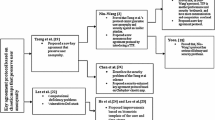Abstract
A key agreement protocol is used to derive a shared secure session key by two or more parties, but no party can predetermine the resulting value. Users can securely exchange information over an open network by using the shared session key to encrypt/decrypt secure information. Recently, several key agreement protocols based on chaotic maps are proposed. Xiao et al. proposed a novel key agreement protocol based on chaotic maps and claimed their protocol can resist the known attack which is proposed by Bergamo et al. However, Han et al. and Xiang et al. pointed out that the Xiao et al. protocol is still insecure. To overcome these attacks, we shall propose an extended chaotic maps-based key agreement protocol. The proposed protocol not only can resist these attacks, but also provide mutual authentication and user anonymity.
Similar content being viewed by others
References
Bergamo, P., D’Arco, P., Santis, A., Kocarev, L.: Security of public-key cryptosystems based on Chebyshev polynomials. IEEE Trans. Circuits Syst. I 52(7), 1382–1393 (2005)
Chen, G., Chen, Y., Liao, X.: An extended method for obtaining s-boxes based on three-dimensional chaotic Baker maps. Chaos Solitons Fractals 31, 571–579 (2007)
Diffie, W., Hellman, M.E.: New direction in cryptography. IEEE Trans. Inf. Theory IT-22(6), 644–654 (1976)
Han, S.: Security of a key agreement protocol based on chaotic maps. Chaos Solitons Fractals 38(3), 764–768 (2008)
Han, S., Chang, E.: Chaotic map based key agreement with/out clock synchronization. Chaos Solitons Fractals 39(3), 1283–1289 (2009)
Harn, L., Lin, H.Y.: Authenticated key agreement without using one-way hash functions. Electron. Lett. 37(10), 629–630 (2001)
Hwang, M.S., Lin, C.W., Lee, C.C.: Improved Yen-Joye’s authenticated multiple-key agreement protocol. Electron. Lett. 38(23), 1429–1431 (2002)
Kocarev, L., Tasev, Z.: Public-key encryption based on Chebyshev maps. In: Proceedings of the 2003 International Symposium on Circuits and Systems, Thailand, vol. 3, pp. 28–31 (2003)
Lee, C.C., Chang, Y.F.: On security of a practical three-party key exchange protocol with round efficiency. Inf. Technol. Control 37(4), 333–335 (2008)
Lee, C.C., Li, L.H., Hwang, M.S.: A remote user authentication scheme using hash functions. Oper. Syst. Rev. 36(4), 23–29 (2002)
Liao, I.E., Lee, C.C., Hwang, M.S.: A password authentication scheme over insecure networks. J. Comput. Syst. Sci. 72(4), 727–740 (2006)
Mason, J.C., Handscomb, D.C.: Chebyshev Polynomials. Chapman & Hall/CRC Press, Boca Raton (2003)
Niu, Y., Wang, X.: An anonymous key agreement protocol based on chaotic maps. Commun. Nonlinear Sci. Numer. Simul. 16(4), 1986–1992 (2011)
Tsai, C.S., Lee, C.C., Hwang, M.S.: Password authentication schemes: current status and key issues. Int. J. Netw. Secur. 3(2), 101–115 (2006)
Tseng, H., Jan, R., Yang, W.: A chaotic maps-based key agreement protocol that preserves user anonymity. In: IEEE International Conference on Communications, ICC’09, Germany, pp. 1–6 (2009)
Wei, J., Liao, X., Wong, K., Xiang, T.: A new chaotic cryptosystem. Chaos Solitons Fractals 30, 1143–1152 (2006)
Wang, Y., Wong, K., Liao, X., Xiang, T.: A block cipher with dynamic S-boxes based on tent map. Commun. Nonlinear Sci. Numer. Simul. 14(7), 3089–3099 (2009)
Xiao, D., Liao, X., Deng, S.: One-way hash function construction based on the chaotic map with changeable-parameter. Chaos Solitons Fractals 24, 65–71 (2005)
Xiao, D., Liao, X., Deng, S.: A novel key agreement protocol based on chaotic maps. Inf. Sci. 177(4), 1136–1142 (2007)
Xiao, D., Liao, X., Wong, K.: An efficient entire chaos-based scheme for deniable authentication. Chaos Solitons Fractals 23(4), 1327–1331 (2005)
Xiang, T., Wong, K., Liao, X.: On the security of a novel key agreement protocol based on chaotic maps. Chaos Solitons Fractals 40(2), 672–675 (2009)
Author information
Authors and Affiliations
Corresponding author
Rights and permissions
About this article
Cite this article
Lee, CC., Chen, CL., Wu, CY. et al. An extended chaotic maps-based key agreement protocol with user anonymity. Nonlinear Dyn 69, 79–87 (2012). https://doi.org/10.1007/s11071-011-0247-4
Received:
Accepted:
Published:
Issue Date:
DOI: https://doi.org/10.1007/s11071-011-0247-4




